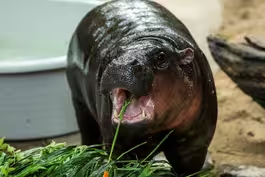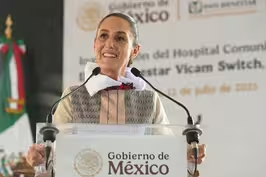
NIH funding cuts threaten research on sickle cell disease
Clip: 7/12/2025 | 5m 23sVideo has Closed Captions
Trump administration’s NIH funding cuts threaten research on sickle cell disease
So far in 2025, the Trump administration has cut more than $1 billion in NIH grants. That includes a study on sickle cell disease, a blood disorder that affects roughly 100,000 people in the U.S. According to the CDC, 90% of them are Black. Ali Rogin speaks with Dr. Charity Oyedeji, a Duke University hematologist whose research grant was terminated, to learn more.
Problems playing video? | Closed Captioning Feedback
Problems playing video? | Closed Captioning Feedback
Major corporate funding for the PBS News Hour is provided by BDO, BNSF, Consumer Cellular, American Cruise Lines, and Raymond James. Funding for the PBS NewsHour Weekend is provided by...

NIH funding cuts threaten research on sickle cell disease
Clip: 7/12/2025 | 5m 23sVideo has Closed Captions
So far in 2025, the Trump administration has cut more than $1 billion in NIH grants. That includes a study on sickle cell disease, a blood disorder that affects roughly 100,000 people in the U.S. According to the CDC, 90% of them are Black. Ali Rogin speaks with Dr. Charity Oyedeji, a Duke University hematologist whose research grant was terminated, to learn more.
Problems playing video? | Closed Captioning Feedback
How to Watch PBS News Hour
PBS News Hour is available to stream on pbs.org and the free PBS App, available on iPhone, Apple TV, Android TV, Android smartphones, Amazon Fire TV, Amazon Fire Tablet, Roku, Samsung Smart TV, and Vizio.
Providing Support for PBS.org
Learn Moreabout PBS online sponsorshipJOHN YANG: So far this year, the Trump administration has cut more than $1 billion in NIH grants that includes a sickle cell disease study.
Sickle cell is a blood disorder that affects roughly 100,000 people in the United States.
According to the CDC, 90 percent of them are black.
Ali Rogan sat down with Dr. Charity Oyedeji, a Duke University hematologist.
Her $750,000 sickle cell research grant was terminated by the Trump administration.
The reason given, DEI.
ALI ROGIN: Thank you so much for joining us.
First, tell us about sickle cell disease and about how you were working to help people who live with it.
CHARITY OYEDEJI, Duke University School of Medicine: Yeah.
So sickle cell disease is a genetic disorder that predominantly affects black people in the United States, but can be in all people of racial or ethnic backgrounds worldwide.
And it's grounded in genetics.
And so it's not necessarily only black people that experience it.
And so the work that I was doing was focused on developing the first and valid functional assessment for people with sickle cell disease and the first exercise program tailored to the unique needs of older adults with sickle cell disease.
ALI ROGIN: And why was it important to look at exercise programs that specifically are suited to this population?
CHARITY OYEDEJI: Yeah, so people with sickle cell disease have historically had fears of exercising due to fears of going into pain.
So they're often triggered by overexertion, stress, weather.
And so that's the hallmark of sickle cell disease.
But it makes it hard for them to be active.
And some even fear that these patients can have sudden death.
And so they really need a program that's tailored to the unique needs that they experience.
ALI ROGIN: And when you found out that the NIH was canceling your grant and that the reason for doing so was DEI, what was your reaction?
CHARITY OYEDEJI: The language of the letter, the termination notice was shocking to me because it used words like the research was low return on investment and harmful to Americans.
And I was like, who wrote this?
Like, who wrote this?
Because this is racist.
Like, this is a racist letter to say that, like, as if my patients are not Americans, or as if studying people with sickle cell disease or even doing equity research is low return.
But improving the health of minority populations and people with sickle cell disease is the opposite.
It's high return.
It improves the health of Americans.
It can prolong life.
And I'm doing the opposite of what this termination notice was even saying.
ALI ROGIN: What message does this send to other researchers who want to get into this line of research?
CHARITY OYEDEJI: The first message to researchers is that it doesn't matter if your work is grounded in evidence.
It doesn't matter if you're doing life changing, groundbreaking, innovative research that it can get discarded without cause.
It tells researchers that focusing on vulnerable populations and underserved populations is not worth the time because they're going to just take your money, you know, and so it really sends the message that maybe people should focus on other areas, like focusing only white men.
Right.
You know, and so it really makes people scared to study the most vulnerable populations in the world.
ALI ROGIN: We asked HHS about your project in particular and why funding was cut.
Here's what HHS spokesperson Andrew Nixon told us in a statement.
Your study has value, but that it was, quote, unquote, funded under an ideologically driven DEI program under the Biden administration, and that future projects will be reviewed based on their, quote, scientific merit.
How would you respond to that?
CHARITY OYEDEJI: Yeah, so I would respond to that by saying the project was already reviewed based on its scientific merit, and it underwent a rigorous review process called a study section that reviewed the science, that reviewed me as a candidate, that reviewed the innovative nature of the project, and they scored it in a high impact zone, which was why it was funded in the first place.
ALI ROGIN: In addition to eliminating the funding for your project, the administration has also cut tremendously the CDC division that dealt with blood disorders, including sickle cell disease.
What does it mean for the federal government writ large to seemingly be divesting from this type of research?
CHARITY OYEDEJI: It's grounded in unscientific agendas, and it's really harmful because we already went many decades without adequate treatments, adequate options to improve the health of people with sickle cell disease.
So this really is destructive, and it's really going to set us back to the 1920s where we didn't have anything, you know, and so it's harmful, and it sends the message to the patients that their lives don't matter, that.
That improving their health doesn't matter.
And so it's really grounded in some dangerous, dangerous racist ideology.
ALI ROGIN: And what are your next steps here?
Do you have options to appeal this decision?
CHARITY OYEDEJI: Yes.
So on the letter, there was an option to appeal.
And so I'm working through that process.
I also am in the process of trying to secure some other additional funds in order to be able to continue the work.
Because at the end of the day, whoever's the president, I'm going to do what I need to do to care for my patients.
ALI ROGIN: Dr. Charity Oyedeji, hematologist at Duke University.
Thank you so much for joining us.
CHARITY OYEDEJI: Yeah, thank you for having me.
Moo Deng, baby hippo who took social media by storm, turns 1
Video has Closed Captions
Clip: 7/12/2025 | 2m 45s | Moo Deng, the baby hippo who took social media by storm, turns 1 (2m 45s)
New analysis reveals FEMA missed major flood risks in Texas
Video has Closed Captions
Clip: 7/12/2025 | 5m 18s | FEMA missed major flood risks at Camp Mystic in Texas, new analysis reveals (5m 18s)
News Wrap: Trump announces 30% tariffs on Mexico and EU
Video has Closed Captions
Clip: 7/12/2025 | 2m 17s | News Wrap: Trump announces 30% tariffs on goods from Mexico and EU (2m 17s)
Search for justice continues for Argentina’s disappeared
Video has Closed Captions
Clip: 7/12/2025 | 7m 50s | Search for justice continues for Argentina’s disappeared, nearly 50 years later (7m 50s)
Providing Support for PBS.org
Learn Moreabout PBS online sponsorshipSupport for PBS provided by:
Major corporate funding for the PBS News Hour is provided by BDO, BNSF, Consumer Cellular, American Cruise Lines, and Raymond James. Funding for the PBS NewsHour Weekend is provided by...















